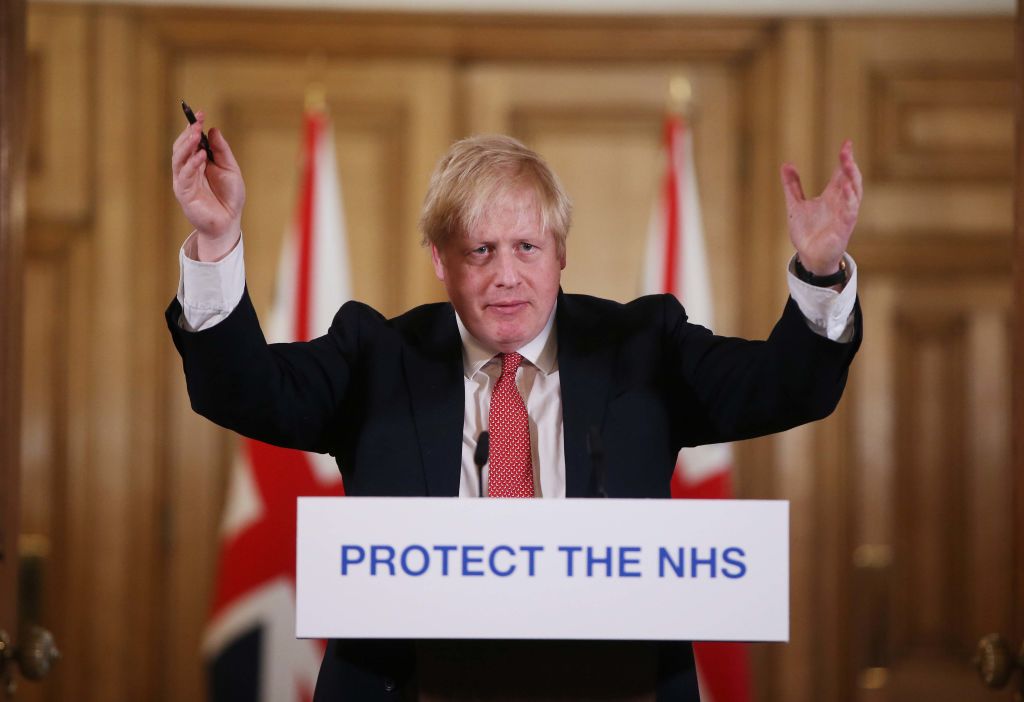There was an extraordinary moment in the government’s Covid-19 news briefing yesterday. Boris Johnson was asked: ‘Prime Minister, people aren’t acting responsibly, so when are you going to bring in the police?’
Boris was aghast. ‘Bring in the police?!’, he said, looking, as one would hope he would, horrified by the prospect of the UK becoming a police state that arrests people for going outside and strolling in parks. Guess which side in this telling Q&A got the most flak? Yep, not the journalist wondering out loud when cops are going to step in, but the PM who has an instinctive loathing of such an authoritarian prospect.
This is the world we live in now: one where wanting a police state makes you a better person than those who think this might be an excessive and unnecessary step.
The government’s news briefings have become startling affairs. Boris and his advisers offer sober but calm assessments of where we’re at right now and what must be done to slow the spread of Covid-19. And the assembled hacks respond by asking when a tougher lockdown is going to be enforced and people will be kept off the streets. The media’s near-uniformity of opinion on this issue has, I must say, been incredibly dispiriting to witness.
There’s a rashness to the demand for a full and unforgiving shutdown of society. Yesterday, commentators and others feverishly shared photos of people walking in parks or along beachfronts and held them up as proof of the stupidity and disobedience of the British masses. This then contributes to a ramping-up of demands for far stricter rules. And it seems likely that at some point this week, these clamourers for a police state will have their wish granted. Are we allowed to take a pause and ask, calmly and rigorously, if this is the best approach?
In the Guardian, David Lammy spells out the thinking behind a total shutdown of London and possibly other places too. ‘[I]f we continue to live as we please over the coming few weeks, the result will be thousands of unnecessary deaths’, he says.
But we need some reason and empathy in this discussion. There will be unintended consequences to a shutdown, too. The full isolation of people, the possibility that you will need a permit to go outdoors, the closure of parks — which is already happening in some London boroughs — will also have a very detrimental impact on people’s health.
The deputy chief medical officer, Dr Jenny Harries — who in my view is the calmest, most reassuring presence in this crisis — touched on this in reference to the government’s plan to isolate 1.5m people with certain medical conditions for a period of three months. This will have a psychological impact, she said, and could create new health problems. Boris made a similar point: people need fresh air and exercise, he said. They need to get out.
I fear that the media class doesn’t understand that not everyone lives the kind of lives that they do. The more well-paid members of the broadcast media will live in spacious apartments or houses. They might even have gardens. They are very well-connected online. Many of them seem to live online, in fact, in Twitterland. Some of them, if they are judged to be key workers, will still be able to travel freely.
What about elderly people who don’t use the internet? Or people who live in small flats with no green spaces? Or people with few social connections? If we shut down society too severely, it seems unquestionable to me that people will suffer — emotionally, socially and physically.
Some expert voices are questioning the wisdom of using lockdowns to tackle Covid-19. David L Katz, founding director of the Yale-Griffin Prevention Research Center in the US, says a shutdown of society could make things worse.
He believes that the ‘near total meltdown of normal life — schools and businesses closed, gatherings banned — [might be] long-lasting and calamitous, possibly graver than the direct toll of the virus itself’. And he is concerned that lockdowns could unwittingly help to spread the disease too, for example by closing colleges and schools and sending ‘young people of indeterminate infectious status… to huddle with their families’.
These matters are worth considering, no? The trouble is that a shrill, censorious climate is emerging in Covid-struck Britain. Anyone who questions the shutdown, anyone who asks if this disease really is an apocalyptic scenario, will be raged against and accused of not caring about people’s lives. We are witnessing the shutdown not only of everyday life, but of public debate and the right to dissent.
We all have to take our responsibilities seriously. I am self-distancing and only going out when I really need to. The voluntarism of the current advice is good — it makes us feel that we still have our agency and that we are properly engaged in this mass act of social solidarity. I fear an enforced and over-the-top lockdown will breed resentment, atomisation and ill-health.
Trump really does have a point when he says we have to ensure that society’s cure to Covid-19 doesn’t prove to be more destructive than the disease itself.







Comments